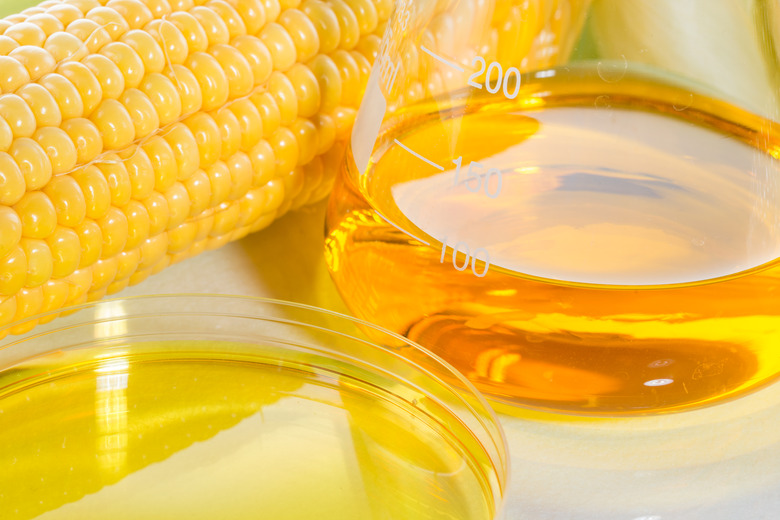Denatured Alcohol Vs. Isopropyl Alcohol
Isopropyl alcohol and denatured alcohol share many similarities. However, their chemical structures, means of production, and toxicity vary. In science, the term alcohol refers to a broad range of organic compounds containing one or more hydroxyl – hydrogen and oxygen – groups. They have a long history of human use as cleaners and disinfectants, although the chemical group's biggest claim to fame can be found in liquor stores and bars: ethyl alcohol, or grain alcohol, finds use among humans as a recreational beverage or drug. However, isopropyl alcohol and denatured alcohol cannot be safely consumed by humans.
TL;DR (Too Long; Didn't Read)
Isopropyl and denatured alcohol share many similarities, but the means by which humans create them, their toxicity, and their purposes vary. Isopropyl alcohol and denatured alcohol cannot be safely consumed by humans.
Alcohol Production Methods
Alcohol Production Methods
Humans make grain alcohol by fermenting fruits or grains, anything with a high starch content. Most often, alcohol that is created to be turned into denatured alcohol comes from sugarcane, beets and corn. After producers make the highly concentrated alcohol, they add a variety of substances to it to prevent humans from drinking it due to its poisonous nature or extremely bitter taste: benzene, formaldehyde and iodine, for example.
While ethyl alcohol isn't particularly harmful to humans before the denaturing process, ingesting isopropyl alcohol can cause vomiting, intestinal bleeding and, in severe cases, death. Producers make isopropyl alcohol through a reaction of propylene, a petroleum byproduct, and sulfuric acid, and then add water.
The two types of alcohol have different chemical formulas: ethanol (C2H6O) and isopropanol (C3H8O). Isopropyl alcohol can be found as a bittering agent in denatured alcohol.
Uses for Different Alcohols
Uses for Different Alcohols
After producers add bittering agents, denatured alcohol becomes more toxic than isopropyl alcohol. Additionally, some of the additive chemicals can harm a human's skin. As such, it rarely finds use in medical settings.
Isopropyl alcohol, on the other hand, can be found in most hospitals and medicine cabinets. It's relatively mild effect on human skin also means cosmetic makers add it to products like hand lotions. Similarly, isopropyl alcohol can be safely used to clean electronic components, unlike denatured alcohol.
When denatured alcohol evaporates, it leaves behind a residue that can affect the sensitive parts of a computer. Similarly, some of the other chemicals in denatured alcohol can be corrosive to plastics. Denatured alcohol can also be found in cosmetics, but most often it finds use as an industrial chemical. Denatured alcohol can be used as fuel for stoves and lamps. Both types of alcohols can be used as solvents and, in some cases, disinfectants.
Cite This Article
MLA
Johnson, Doug. "Denatured Alcohol Vs. Isopropyl Alcohol" sciencing.com, https://www.sciencing.com/denatured-alcohol-vs-isopropyl-alcohol-5519636/. 7 May 2018.
APA
Johnson, Doug. (2018, May 7). Denatured Alcohol Vs. Isopropyl Alcohol. sciencing.com. Retrieved from https://www.sciencing.com/denatured-alcohol-vs-isopropyl-alcohol-5519636/
Chicago
Johnson, Doug. Denatured Alcohol Vs. Isopropyl Alcohol last modified August 30, 2022. https://www.sciencing.com/denatured-alcohol-vs-isopropyl-alcohol-5519636/
